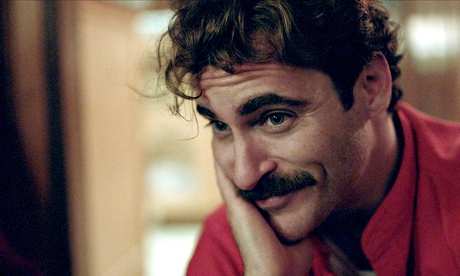
Lavishly alien visions of the future are never half as disorienting as those that more or less resemble the world we live in now. In Spike Jonze's shimmeringly beautiful techno-romance Her (Entertainment in Video, 15) – the week's best DVD release by a country mile – today's skinny jeans are tomorrow's high-waisted slacks, but beyond such cosmetic changes, Jonze's anticipated ways of living feel awfully familiar. Theodore (Joaquin Phoenix) is a shy nebbish who deals with the pain of his divorce by falling head over heels in love with his husky-voiced operating system (the unseen Scarlett Johansson), an increasingly independent digital organism that reciprocates his affection.
The premise sounds reassuringly absurd until you observe a busload of commuters with their noses buried in their smartphones or consider the online attachments we form, be it via email, Twitter or Tinder, to people we may never meet.
Jonze's elegantly cockeyed, Oscar-winning script astutely examines human communication in all its intimate and faux-personal forms, yet the tone is never smugly mordant or instructive – it's warmly open to all emotional possibilities, digitally enabled or otherwise. Phoenix has never been this bruised or guardedly lovable on screen. The film's most under-celebrated element, meanwhile, is the marvellous work of Amy Adams as a neighbour who may represent Theodore's last shot at analogue connection. No detail of performance or design is wasted in Her's immaculate world-building; it's a film that should reward repeated consideration over the years.
Mainstream releases are still shying away from the World Cup – only Disney's sparkly enough, diverting-enough bit of kiddie filler, Tinker Bell and the Pirate Fairy (Disney, U), can reasonably count on a receptive audience. Otherwise, that makes it a busier week than usual for challenging arthouse options, not all of them up to their commendable ambition.
Joanna Hogg's aggressively abstract third feature Exhibition (Artificial Eye, 15) comes as a noble disappointment after the pristinely observed character drama of Unrelated and Archipelago. Set in a modernist London house, the crisp angles and corners of which exude more personality than the people within it, the film allusively charts the marital unravelling of freelance artists D and H – Hogg's bare-boned script is above such petty details as names and exact professions – as they decide to sell up and move on. To where, or what, we don't know, and you're unlikely to care; it's a work of ennui without articulation, exquisitely crafted but full of cold air. Hogg has done, and will do, better than this.
Another one for the alluring-but-frustrating pile – less well executed, but with even dreamier interiors – is The Strange Colour of Your Body's Tears (Metrodome, 18). The title is the kind of thing arthouse opponents make up to justify their antipathy; then again, so is the film, a French-Belgian homage to Italian giallo horror that's all image and no idea.
That, at least, can't be said for James Franco's As I Lay Dying (Lionsgate, 15), a dauntless but inevitably doomed adaptation of William Faulkner's stream-of-consciousness funeral opus that attempts to represent the novel's shifting abundance of narrative voices with an itchy split-screen technique. It's a wobbly concept on paper, more so in practice, but has its surges of feeling.
A more assured but less gutsy stab at a well-regarded novel is The Sea (Independent, 12), which adapts John Banville's Booker-winning Irish memory piece with televisual good taste and attentive performances, with Sinead Cusack's pithy turn as a cancer-stricken woman a welcome injection of heat.
Two Russian studies of historical heroism are perhaps more interesting as political artefacts than as individual films. The state-funded Gagarin: First in Space (Entertainment One, 12) is a handsome but palpably one-sided documentary canonising the cosmonaut; brash blockbuster Stalingrad (Sony, 15) memorialises the eponymous battle with muscular, blood-on-the-lens technique and video-game chest-beating. It's a fascinatingly Putin-era period piece.
Two essential new additions to the Netflix library come from opposite universes. The streaming service's still under-furnished selection of Golden Age Hollywood classics gets a boost with Howard Hawks's hyper-verbal romantic comedy His Girl Friday, its gender-battle banter as breathless and stimulating now as it must have been in 1940. Shane Carruth's ravishing Upstream Color, meanwhile, is a romantic sci-fi vision that comes from an equally lyrical but far frostier section of the id than Her; pair them together to feel dizzily uncertain about the shape of things to come.

